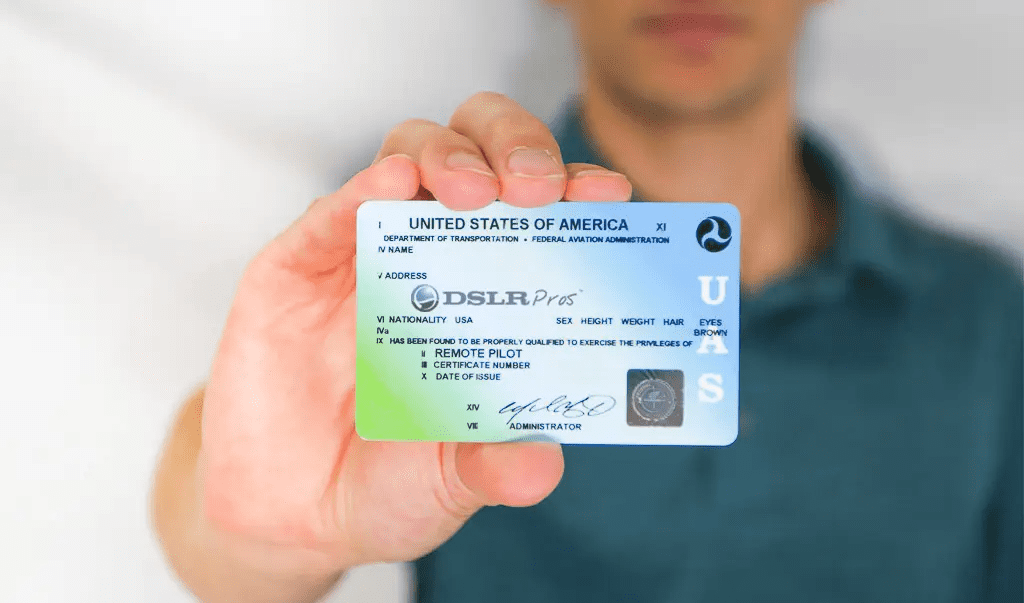Why Your Drone License May Not Be Enough to Land a Job
So, you've got your drone certification in hand and you're ready to set the skies ablaze with your talent and ambition? Not so fast, speedster. While getting permission to fly is a critical first step in the pathway to a drone job, it's just the tip of the iceberg—and not even the good tip that gets an ice sculpture contest award—in the competitive drone industry.
Let's be clear about the situation you might find yourself in: you're qualified to fly a drone, but certifiable drone operators are a dime a dozen in an every-dog-has-his-day market. And don't think you can just "assemble" a competitive portfolio of aerial work to get that audacious offer letter you're hoping for.
The reality is that a certification alone won't automatically open doors to lucrative drone operator opportunities. The market is evolving rapidly, and employers are looking for professionals who bring more to the table than just a piece of paper.
"The future of drone technology is bright, and there are many opportunities for skilled professionals." - Drone Life

Aerial cinematographers can go for broke in the shallow end of the pool with mid-range drones; the real challenge is using the aerial data you capture in a way that yields actionable insights across various dimensions (i.e., the 360-degree view necessary in a rooftop-to-basement inspection of a building). And this is no secret: employers inevitably gravitate toward the candidates they perceive as having both the requisite skills to operate a drone and the underlying technical intelligence to make good use of it—and those candidates are few and far between.
What Distinguishes Successful Drone Professionals?
- Advanced technical skills beyond basic piloting
- Specialized industry knowledge
- Portfolio of compelling aerial work
- Continuous learning and adaptability
- Networking and industry connections
Think of your drone license like a driver's license. It proves you can operate the vehicle, but it doesn't guarantee you'll be hired as a professional driver. The same principle applies in the drone world.
Ready to level up your drone career game? Stay tuned as we dive deeper into what it really takes to stand out in the competitive UAV employment landscape.

The Licensing Myth: Why Certification Alone Isn't Enough
Let's cut to the chase: your shiny drone license is essentially a permission slip, not a golden ticket to dream drone pilot jobs. While certification demonstrates basic competency, it's just the first tiny step in a marathon of professional development.
Beyond the Basic Certification
Think of your drone license like a culinary school diploma. Sure, you've learned fundamental techniques, but that doesn't automatically make you a Michelin-star chef. In the drone industry, employers are hunting for multifaceted professionals who bring more than just regulatory compliance to the table.
- Technical prowess that goes beyond standard flight operations
- Industry-specific expertise in sectors like media, agriculture, or infrastructure
- Advanced data analysis and processing skills
- Understanding of cutting-edge drone technologies
The Skills Gap
According to industry insights, the drone job market is increasingly sophisticated. Companies aren't just looking for pilots; they're seeking tech-savvy professionals who can transform aerial data into actionable intelligence.
"The most successful drone professionals are those who continuously adapt and expand their skill set beyond basic piloting." - Drone Industry Experts
Want to truly stand out in your UAV employment quest? We suggest developing specialized skills like:
- Advanced aerial cinematography techniques
- GIS mapping and geospatial analysis
- Machine learning and AI integration with drone systems
- Thermal imaging and infrared data interpretation
Your license is just the entry ticket. Your skills, creativity, and continuous learning are what will ultimately propel your drone career to new heights.
Technical Skills That Employers Actually Want
When it comes to getting a drone job, your technical skills are the rocket fuel that will launch your career beyond basic certification. Employers aren't just looking for someone who can fly a drone – they want a Swiss Army knife of technological prowess.
The Tech Toolkit Employers Crave
- Advanced Data Processing Skills: Transforming raw aerial footage into actionable insights is worth its weight in gold. Learn software like QGIS, ArcGIS, and PhotoScan to stand out in the UAV employment landscape.
- Programming Proficiency: Python, C++, and drone-specific programming languages can set you apart in drone job listings. Think of code as your secret weapon in the drone job market.
- Machine Learning & AI Integration: Understanding how to implement AI for autonomous flight and advanced image recognition is becoming crucial in professional drone operator opportunities.
The drone industry isn't just about flying – it's about intelligent, data-driven solutions. Companies are seeking professionals who can turn aerial captures into strategic insights.
Specialized Technical Competencies
- Thermal imaging analysis
- LiDAR data interpretation
- Advanced geospatial mapping
- Drone maintenance and technical troubleshooting
Pro tip: Don't just collect certifications – build a portfolio that showcases your technical range. Whether it's complex mapping projects, AI-driven flight algorithms, or innovative data processing techniques, demonstrate that you're more than just a remote pilot.
Industry-Specific Technical Skills
Different sectors demand unique technical approaches:
- Media & Entertainment: Advanced stabilization techniques, color grading skills
- Agriculture: Crop health analysis, multispectral imaging
- Construction: 3D modeling, progress tracking algorithms
- Infrastructure: Predictive maintenance analysis, structural integrity assessment
In the cutthroat world of drone job listings, your portfolio isn't just a collection of images—it's your professional passport. Think of it as your aerial resume, showcasing not just what you can do, but how uniquely you can do it.
More Than Just Pretty Pictures
Employers are looking for storytellers, not just "button-pushers". Your portfolio and personality should demonstrate:
- Technical complexity beyond basic flight maneuvers
- Problem-solving capabilities through diverse project examples
- Industry-specific expertise
- Creative and innovative approach to drone applications
Strategic Portfolio Development
When building your portfolio for professional drone pilot positions, consider these strategic approaches:
- Diversify Your Content: Don't just showcase pretty landscapes. Include technical projects like:
- Thermal mapping for infrastructure inspection
- Agricultural crop health analysis
- Urban planning 3D modeling
- Highlight Technical Skills: Demonstrate data processing capabilities, not just flight skills
- Include Quantifiable Outcomes: Show how your drone work solved a real-world problem
- Certifications and specialized training documents
Pro tip: Create an online platform or website that makes your portfolio easily accessible. Platforms like Behance or a personal website can significantly boost your visibility and online presence.

Networking and Industry Connections
Think of networking like drone flight—it's all about strategic navigation and making meaningful connections. The drone industry might seem vast, but it's surprisingly tight-knit, and personal relationships can open doors that certifications never could.
- Industry Events and Conferences: Attend drone technology symposiums, UAV conferences, and tech meetups
- Online Communities: Engage in professional forums, LinkedIn groups, and specialized drone platforms like ours. Apply here.
- Professional Associations: Join organizations like the Association for Unmanned Vehicle Systems International (AUVSI)
Strategic Networking Approaches
Networking isn't about collecting business cards—it's about building genuine, mutually beneficial relationships. Here are a few tips on how to make new meaningful connections:
- Offer value before asking for anything
- Share your unique projects and insights
- Follow up and maintain relationships
- Be genuinely curious about others' work
Digital Networking Strategies
In today's digital age, your online presence is your professional calling card. Optimize your approach to careers with drones with these digital networking tips:
- Create a professional LinkedIn profile highlighting your drone expertise
- Share and comment on industry-relevant content
- Showcase your portfolio and technical projects
- Connect with industry leaders and potential employers
Pro tip: Platforms like GitHub, Behance, and specialized drone forums can be goldmines for professional connections. Don't just be a passive observer—actively participate and showcase your expertise.
Mentorship and Learning
Some of the most valuable networking happens through mentorship. Seek out experienced drone professionals who can provide guidance, insights, and potentially recommend you for professional drone pilot positions.
"The most successful drone professionals are those who understand that networking is a continuous learning process." - Drone Industry Leaders
Remember, in the world of drone jobs, your network can be the difference between watching opportunities fly by and soaring to new professional heights. Stay connected, stay curious, and keep your professional radar always scanning.
Specialization: Your Competitive Advantage
In the rapidly evolving landscape of getting a drone job, being a jack-of-all-trades might sound appealing, but being a master of one can be your golden ticket to standout.
Specialization isn't just a career strategy—it's your professional superpower. Think of it like choosing a superhero identity in the drone universe. Instead of being a generic "drone pilot," you become the go-to expert in a specific domain.
Why Specialization Matters
- Higher Market Value: Specialized skills command premium rates in drone job listings
- Competitive Differentiation: Stand out in a sea of generalist remote pilots
- Deeper Industry Expertise: Become an invaluable problem-solver in your niche
Emerging Specialization Domains For 2025
- Precision Agriculture: Drone-based crop health monitoring and precision farming
- Infrastructure Inspection: Advanced thermal and structural analysis
- Environmental Monitoring: Wildlife tracking and ecosystem assessment
- Urban Planning: 3D mapping and geospatial intelligence
A generalist might know how to fly a drone, but a specialized professional understands how to extract meaningful data that drives critical business decisions. That's the difference between professional drone pilot positions and having a truly impactful drone career.
Don't just choose a specialization—become obsessed with it. The most successful drone professionals are those who dive deep, not wide. Your passion and expertise will naturally attract opportunities that generalists can only dream about.
In this highly competitive drone industry, specialization isn't just a strategy—it's your professional differentiator, and you must set yourself apart. Choose your niche, become extraordinary, and watch your drone career take flight.
Continuous Learning and Certification
Your learning will never truly end. Think of your professional development like a drone's flight path – constantly adjusting, recalibrating, and evolving to navigate complex terrain.
The Learning Ecosystem
Your initial drone license is just the launchpad, not the destination. The most successful professionals in the drone industry understand that continuous learning isn't optional.
- Online Courses: Platforms like Udemy, Coursera offer specialized drone technology training.
- Advanced Certifications: Beyond basic licenses, seek industry-specific credentials
- Technical Workshops: Hands-on training in emerging drone technologies
- Industry Conferences: Stay updated with the latest technological innovations
Consider investing in cutting-edge learning paths that go beyond traditional drone piloting, including AI and machine learning integrations and advanced data processing techniques. Even simply learning emerging drone software ecosystems can position you ahead of other applicants.
Treat your professional development like a software update – regular, consistent, and always aimed at improving performance. Don't forget: stagnation is the real flight risk!
In the world of drone technology, your most valuable asset isn't your current skill set – it's your capacity to learn, adapt, and grow. Keep your mind as agile as your drone, and the sky's not the limit.
Your drone license is just the beginning of your journey. To truly succeed in getting a drone job, you'll need a combination of technical skills, practical experience, networking, and a commitment to continuous professional development. The most successful drone professionals are those who view their license not as an endpoint, but as a launching pad for this dynamic and exciting career.